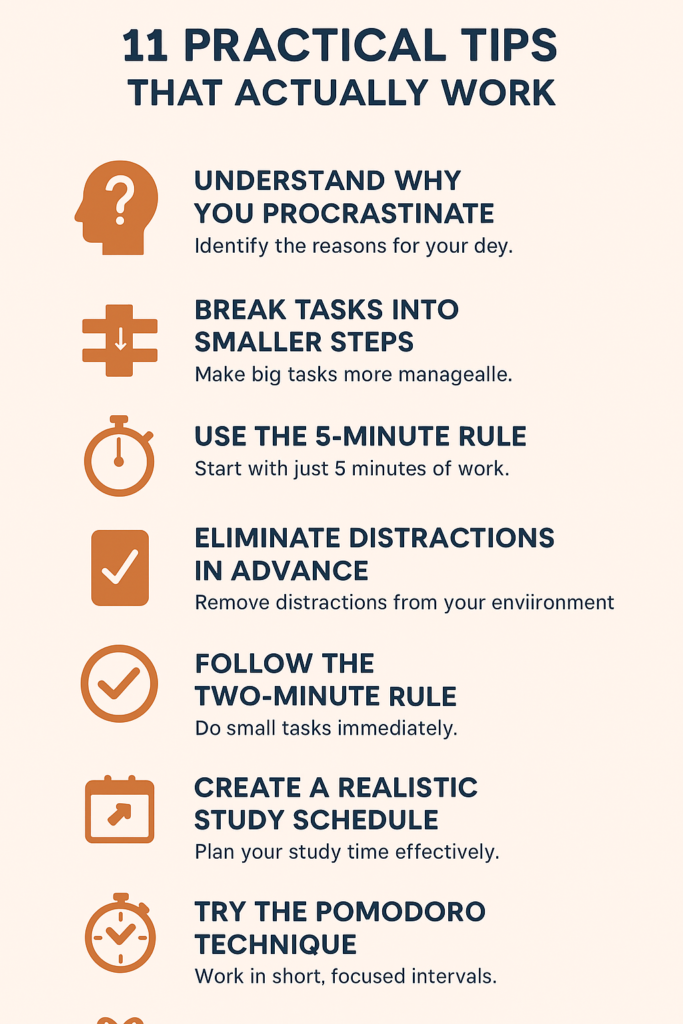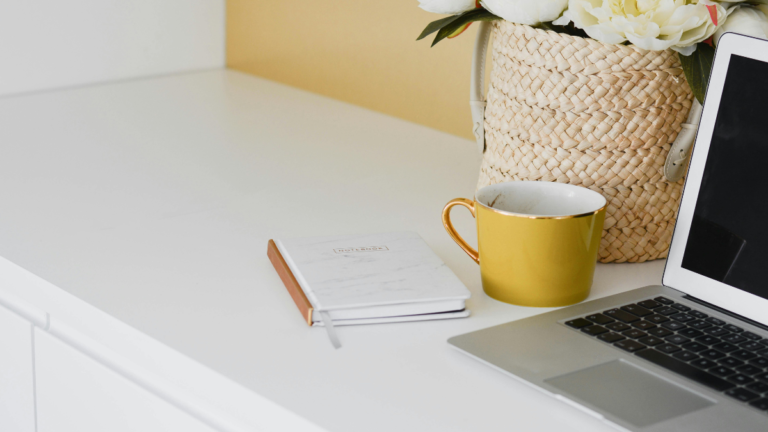How to Stop Procrastinating as a Student: 11 Practical Tips That Actually Work
Procrastination is the silent thief of time, and as students, we know how often it creeps in—whether it’s putting off a research paper until the last minute, scrolling TikTok instead of revising, or convincing ourselves we’ll “start tomorrow.” The problem? Tomorrow often turns into weeks, and stress builds up.
The good news: procrastination isn’t a personality trait—it’s a habit. And habits can be changed. Below are 11 practical tips that actually work for students to beat procrastination and start getting things done.

1. Understand Why You Procrastinate
The first step to fixing procrastination is understanding why you’re doing it. Most of the time, it’s not laziness—it’s avoidance. Maybe the task feels overwhelming, boring, or you fear failing at it.
👉 Try asking yourself: Am I avoiding this because it’s unclear, difficult, or uncomfortable? Once you know the reason, you can tackle it directly.
2. Break Tasks into Smaller Steps
Big tasks can feel impossible, which makes it easier to delay. Breaking them down makes them less intimidating.
- Instead of “write essay,” make it:
- Pick topic
- Research sources
- Write introduction
- Write body paragraphs
- Edit draft
Each small win builds momentum, making it easier to keep going.
3. Use the 5-Minute Rule
If you’re struggling to start, tell yourself you’ll do just five minutes of the task. Most of the time, once you begin, you’ll keep going.
This “trick” works because the hardest part is starting, not doing.
4. Eliminate Distractions in Advance
Procrastination thrives on distractions. Notifications, open tabs, or even background noise can pull your attention away.
- Put your phone in another room.
- Use website blockers during study sessions (like Cold Turkey or Freedom).
- Keep your study space clean and minimal.
5. Follow the Two-Minute Rule
If a task takes less than two minutes—like replying to an email, tidying your desk, or printing notes—do it immediately instead of postponing.
This prevents small tasks from piling up and becoming overwhelming.
6. Create a Realistic Study Schedule
Often procrastination happens because we don’t plan our time well. Instead of saying “I’ll study all day,” break it into specific study blocks.
For example:
- 10 AM – 11 AM: Biology chapter 2
- 11:15 AM – 12 PM: Revise math exercises
- 1 PM – 2 PM: Draft English essay intro
Having a set plan makes it easier to start and harder to delay.
7. Try the Pomodoro Technique
Work in 25-minute focused sessions followed by a 5-minute break. After four sessions, take a longer break.
This keeps you from burning out and gives your brain a clear rhythm of work + rest.
8. Reward Yourself for Progress
Procrastination often happens because the task feels like a punishment. Flip it by rewarding yourself when you finish a task.
- Complete a chapter → watch an episode of your favorite show
- Finish a problem set → grab a snack you like
- Submit an assignment → take a walk or listen to music
Small rewards build positive associations with productivity.
9. Get an Accountability Partner
It’s harder to procrastinate when someone else is checking in on you.
- Pair up with a friend and set shared deadlines.
- Do study sessions together (in person or on Zoom).
- Text each other updates after finishing tasks.
Accountability adds healthy pressure and encouragement.
10. Focus on Progress, Not Perfection
A huge cause of procrastination is perfectionism—the idea that your work must be flawless before you start. This mindset delays progress.
Instead, aim for “done, then improved.” Start messy, then refine. Remember, you can’t edit a blank page.
11. Take Care of Your Body and Mind
When you’re tired, hungry, or stressed, procrastination becomes easier. Concentration comes naturally when your body feels good.
- Sleep at least 7–8 hours.
- Stay hydrated throughout study sessions.
- Move your body—stretch, walk, or exercise.
When your energy is steady, procrastination has less control over you.
Final Thoughts
Procrastination doesn’t disappear overnight—it’s a habit that requires patience and practice to overcome. Start small: break tasks down, commit to just 5 minutes, and use techniques like Pomodoro to structure your time. Pair that with good sleep, accountability, and realistic goals, and you’ll slowly rewire your brain for productivity.
Remember: productivity isn’t about being busy—it’s about being consistent. And the more you practice these strategies, the easier it becomes to stay on track.


